- About
- Intara
- Capabilities
- Advisory
- Resources
- News
- Store
12 October 2023
Israel-Gaza: Situation update, 12 October 2023
Key points
- The Israel Air Force announced at 0550 h local time, “During the night [of 12 October] the air force launched a wave of attacks with the aim of continuing to damage the commando force of the terrorist organization Hamas known as ‘Nukhba', by attacking [its] operational headquarters, which were used by operatives who infiltrated the Otaf settlements last Saturday [7 October]
- US Secretary of State Antony Blinken arrived in Israel on 12 October to meet with President Isaac Herzog and Prime Minister Benjamin Netanyahu. Blinken is also scheduled to meet Palestinian Authority President Mahmoud Abbas in Jordan's capital Amman on 13 October
- On 12 October Israeli airstrikes targeted Damascus and Aleppo international airports, highly likely as a warning to Iran against transporting weapons and personnel to Syria amidst the ongoing clashes in southern Syria
- As of 12 October Janes assesses that the open-source information signalling from both Israel and Hizbullah makes it likely that both parties are attempting to contain conflict escalation along the border
- Evacuations from Israel by Romania, Poland, and Mexico occurred on 10 and 11 October 2023
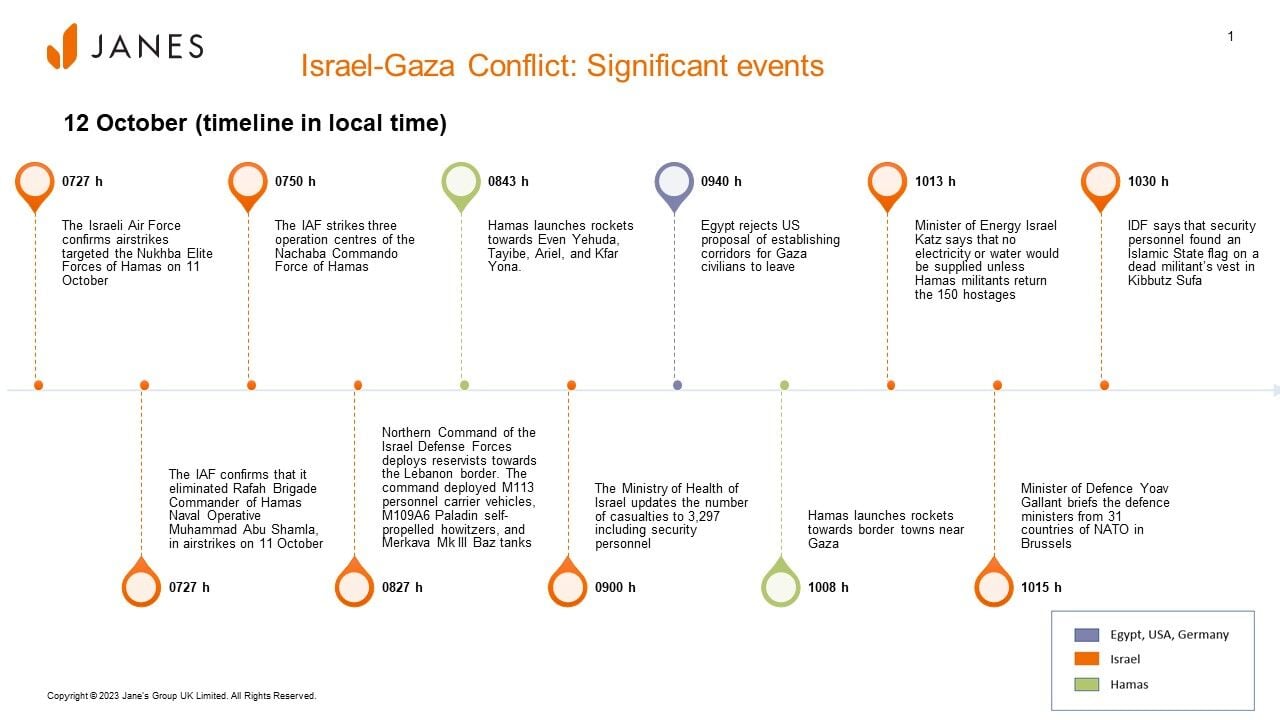
Israel-Gaza conflict: Significant events on 12 October 2023. (Janes)
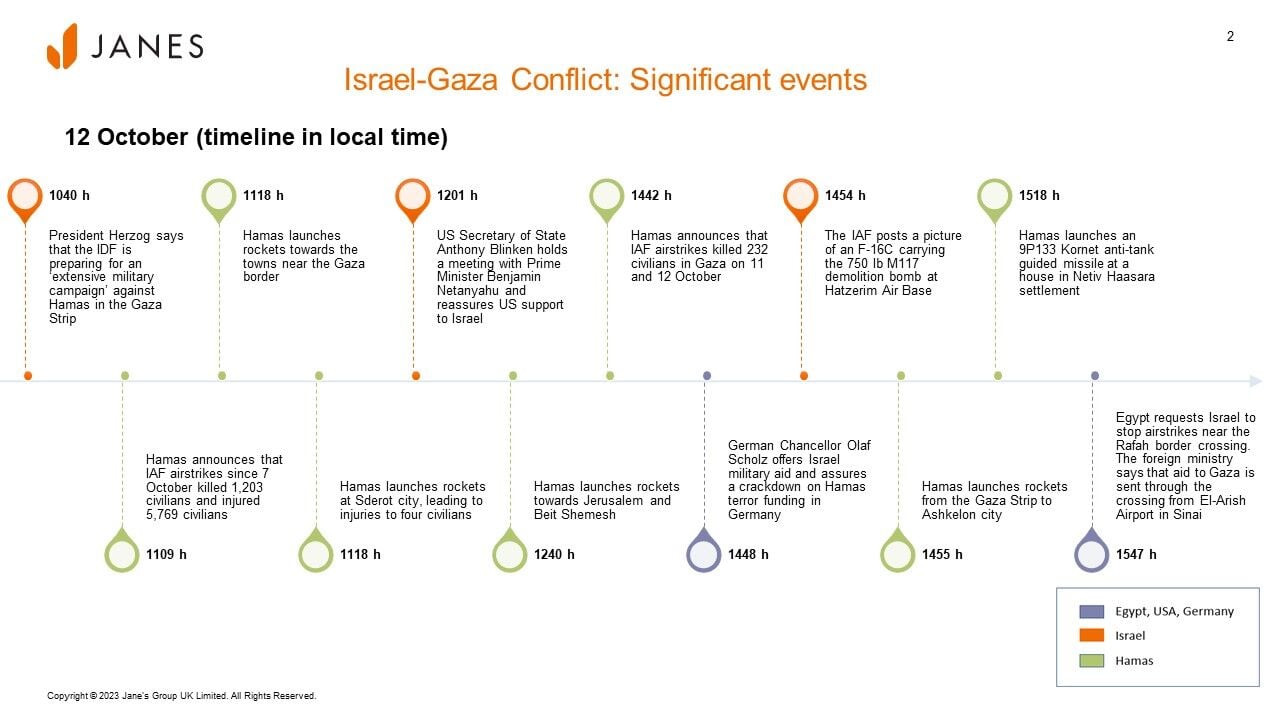
Israel-Gaza conflict: Significant events on 12 October 2023. (Janes)
Israel Air Force Statements on X – 12 October 2023
1510 h local time: “The air force continues to vigorously attack terrorist infrastructure throughout the Gaza Strip; So far the air force has dropped about 6,000 bombs against Hamas targets. Starting in the morning dozens of fighter jets, helicopter gunships, and aircraft of the air force attacked a series of terrorist targets of the terrorist organization Hamas throughout the Gaza Strip. In the meantime, the IDF [Israel Defense Forces] eliminated a commander of the terrorist organization Hamas and a group of operatives who stayed with him and engaged in directing terrorism against the State of Israel, as well as a combat management room of the Rafah Brigade in the southern Gaza Strip. The air force's strikes were concentrated in Gaza City and its outskirts, where the leaders of the Hamas terrorist organization operate. Also, extensive damage was done to the central neighbourhoods in the north of the Gaza Strip that were used as gathering areas for Hamas terrorists. The neighbourhoods of Beit Hanoun, Sajaiya, Rimal, Al-Furqan, and Tafuah suffered heavy damage and hundreds of terrorists were killed. In the attacks hundreds of terrorists were killed and over 3,600 targets were attacked. Among the targets attacked were command-and-control targets, strategic military infrastructures, munitions production sites, intelligence assets, leadership targets, naval superiority targets, and rocket array targets. So far, about 6,000 bombs weighing 4,000 tons have been dropped on the Gaza Strip.”
1440 h local time: “An interceptor was launched a short time ago in the northern region due to detection in the skies of the country. An examination shows that it is not a hostile aircraft, and it is a false interception.”
1259 h local time: “As part of the IDF's activity to gather additional forces to join the fighting effort, the air force is flying back to Israel from several countries in the world regular and reserve fighters who are abroad.”
0550 h local time: “During the night [of 12 October] the air force launched a wave of attacks with the aim of continuing to damage the commando force of the terrorist organization Hamas known as ‘Nukhba', by attacking [its] operational headquarters, which were used by operatives who infiltrated the Otaf settlements last Saturday [7 October]. The ‘Nukhba' force consists of terrorists selected by senior Hamas officials whose mission is to carry out terrorist operations such as ambushes, raids, sabotage operations, anti-tank and rocket fire, sniping, camouflage, and tunnel penetration. This [Nukhba] force was one of the leaders of the forces that infiltrated Israel last Saturday in order to carry out murderous terrorist acts against the citizens of the State of Israel. Also, air force aircraft killed Muhammad Abu Shamla, a senior operative from the Hamas naval formation in the Rafah Brigade. Abu Shamla's house was also used to store naval weapons intended to carry out terrorist operations against Israel.”
0309 h local time: “The IDF is now launching an extensive attack on many centers of the terrorist organization Hamas in the Gaza Strip.”
Hizbullah and Israel's northern border
As of 12 October Janes assesses that the open-source information signalling from both Israel and Hizbullah makes it likely that both parties are attempting to contain conflict escalation along the border. Janes assesses it is likely that the attacks conducted by both parties so far have been within a tolerable level, preventing a major escalation leading to a war between Israel and Lebanon. At the time of publication, statements surrounding these attacks from both Israel and Hizbullah continue to emphasise that these operations are occurring within a context of direct response to aggression from the other side. However, there remains a significant risk of escalation by both sides owing to unforeseeable events or rogue actors. In addition, a lack of internal stability or security force agency in Lebanon and a domestic demand for action among Hizbullah supporters mean the group enjoys a significant degree of freedom of action in this regard.
Syria
On 12 October Israeli airstrikes targeted Damascus and Aleppo international airports. These are highly likely to be a warning to Iran against transporting weapons and personnel to Syria amidst the ongoing clashes in southern Syria.
The Syrian Observer claimed that on 10 October, Iran-backed militia groups were moving into the Tal al-Qaed village near Jabab town and the Talul al-Shaar area in northern Deraa governorate, and the Kroum area in Quneitra governorate. The Syrian Observer further claimed that the militia groups were carrying drones and Iranian Fajr missiles among other unspecified weaponry.
Similarly, the Eye of the Euphrates, a media network specialised in transmitting news from Deir al-Zour, claimed that on 9 October, the Islamic Revolution Guard Corps (IRGC) transported at least 50 militia members from Deir al-Zour to Damascus. The source claimed that the militia members were trained in using anti-aircraft missiles, Katyusha rockets, and other missiles. On the same day, suspected Israeli airstrikes targeted Iran-backed militia positions in the outskirts of the al-Heri village in the countryside of al-Bukamal, in Deir al-Zour governorate, likely to contain the movement of the militants and weaponry from Iraq to southern Syria.
Meanwhile, Naher Media claimed that on 8 October, at least 12 buses carrying Iran-backed militia members entered Syria from Iraq, while Orient News claimed that at least 22 buses carrying Iran-backed militias crossed into Syria from Iraq since 8 October. Naher media also claimed that the IRGC transferred approximately 100 members from Deir al-Zour to southern Syria.
Despite the movement of several Iran-backed militias to southern Syria from Iraq and northern Syria, at the time of publication, there were no renewed clashes in the Israel-Syria border areas since 11 October. Janes assesses that the movement of Iran-backed militias from Iraq and northern Syria into southern Syria could be because of two reasons. Firstly, Iran likely seeks to exploit the ongoing conflict in northern Israel to further increase its presence and influence in southern Syria, especially Damascus.
Secondly, the presence of these militias will offer Iran with several choices of action in the case of an escalation in clashes in northern Israel, including further assisting Hizbullah militants by opening a new front of conflict in southern Syria. However, such escalations depend on several factors, including the scale and scope of any potential ground offensive in the Gaza Strip by the IDF, the scale and scope of the clashes along the Israel-Lebanon border, and the potential involvement of United States security forces beyond deterrence and likely supply missions to Israel.
Iraq
Since the attacks of 7 October by Hamas-led forces into southern Israel, statements have been made by various actors within Iraq about their views and intentions on the ongoing conflict.
Prime Minister Mohammed Shia Al-Sudani: In a 9 October speech, Prime Minister Sudani indicated that his “government expressed its position towards the events taking place in occupied Palestine, and that the government's position is a confirmation of Iraq's firm position towards the Palestinian cause and the struggle of the Palestinian people”. He also said that “this intifada is a natural result because of the great injustice inflicted on the Palestinian people over the past period, from the continued violations and abuses on Al-Aqsa Mosque, the settlement policy, and the crimes committed against the Palestinian people over the past period, and unfortunately these crimes and these violations in front of them was [met with] the silence and ignorance of the international community, and the repudiation of its decisions”. Importantly, Sudani also said that “as a government, we have expressed our position, and the political forces have also expressed statements and positions, which are a reflection of the adoption of our people”.
The “political forces” reference in Sudani's speech is very likely associated with the many Shia armed groups and factions, which make up the Shiite Coordination Framework (SCF) within Iraq. Below are several of their responses since 7 October:
Hadi Al-Amiri – Secretary-general of the Badr Organisation (10 October 2023): A report by Reuters on 10 October quoted Amiri as saying on 9 October about the US that “if they intervene, we would intervene ... we will consider all American targets legitimate”.
Akram Abbas al-Ka'abi – Secretary-general of Harakat Hezbollah al-Nujaba (9 October 2023): Ka'abi was reported by Amwaj media as saying that “any intervention by the US or other states in support of Israel will be met with a “decisive military response”. Ka'abi added that if Israel expands the “battlefield”, it will be met with “the drones and missiles of the resistance”.
Abu Alaa Al-Walai – Secretary-general of Kata'ib Sayyid al-Shuhada (8 October 2023): “Palestine is not Ukraine; if America intervenes directly in the current events in it, to stabilize the collapsing entity, all the American presence in the region will turn into legitimate targets for the axis of resistance. The blow will then be met with blows, and there will be no red lines left.”.
Qais al-Khazali – Secretary-general of Asa'ib Ahl al-Haq (7 October 2023): He stated that his group would be monitoring developments in the area and would be “prepared for action”.
Assessment
Iraqi SCF and Popular Mobilisation Forces (PMF) have clearly stated their position with regards to the conflict, especially about any involvement by the US in it. It is very likely that any commencement of operations by the US will trigger more condemnation by these Iraqi forces and will very likely mean that they will consider sending forces to help in the conflict.
There is a realistic probability that these groups might already be trying to move fighters, helpers, or material through Syria to help Hizbullah, especially since many PMF groups worked with Hizbullah in Syria during the Syrian civil war. Janes, however, has a low confidence in this assessment because of the limited availability of open-sources.
These groups are also concerned with internal developments within Iraq, and the amount of resources that could be sent to help in the conflict is likely to be limited, with experienced fighters and commanders being likely of most use. While the SCF and PMF groups have access to plentiful handheld weapons, the groups themselves only have limited capabilities within the areas of unmanned aerial vehicles (UAVs) and missile technology, which are generally not as advanced as those of Hizbullah and those demonstrated by Hamas in its offensive on 7 October.
Iran will however likely be co-ordinating with the PMF groups in Iraq, and there is a realistic probability that Iran could seek to co-ordinate the PMF's response from Iraq, especially if a ground invasion by the IDF into the Gaza Strip commences and the US becomes more involved by engaging in activities other than supply and deterrence operations.
United States
US Secretary of State Antony Blinken arrived in Israel on 12 October to meet with President Isaac Herzog and Prime Minister Benjamin Netanyahu. Blinken is also scheduled to meet Palestinian Authority President Mahmoud Abbas in Jordan's capital Amman on 13 October. In a joint press conference with Netanyahu, Blinken reaffirmed Israel's right to self-defence, adding that “how Israel does this, matters”.
Ahead of the visit, Blinken stated that the USS Gerald R Ford aircraft carrier had been deployed to the region “to make very clear our intent to deter anyone contemplating further aggression against Israel”. The statement and the deployment are almost certainly directed towards Hizbullah and the group's Iranian backers.
Although the US' position towards Israel is very unlikely to shift significantly in the short-to-medium term, President Joe Biden faces Congressional pressure to freeze USD6 billion worth of Iranian assets seized by the US that Washington released in exchange for prisoners in September. Republican senators Mitch McConnell and Tom Cotton introduced a bill to re-freeze the assets on 12 October, alleging the move had emboldened Iranian support for Hamas. Six Democratic Party senators including Joe Manchin and Tammy Baldwin backed the call to re-implement the seizure. Further public support for the measure from Democratic Party senators will increase the likelihood of the funds being frozen.
Janes assesses that in the immediate term the administration of President Biden and Congress will remain highly supportive of Israel's operations in response to the attack by Hamas-led forces on 7 October 2023. In the short-to-medium term, it is likely that this support may become more qualified and dependent on how any potential Israeli operation in the Gaza Strip is conducted. Washington will likely remain concerned how any potential Israeli operations in Gaza affect the civilian population and how this may increase pressure from Arab allies in the region for Washington to moderate its stance. Indeed, these pressures could come formally from official governments in the Middle East or from substate elements and factions, especially those of a Shia disposition such as the PMF in Iraq that may target US assets, infrastructure, or personnel in these areas over the US' support for Israel.
France – Germany – Italy – United Kingdom
On 9 October the heads of states of France, Germany, Italy, the United Kingdom, and the United States held a call and released a joint statement on the Israel-Palestine conflict. In the statement, the countries expressed their “steadfast and united support to the State of Israel, and our unequivocal condemnation of Hamas and its appalling acts of terrorism”. They also declared their support for Israel in “its efforts to defend itself and its people against such atrocities” and that “this is not a moment for any party hostile to Israel to exploit these attacks to seek advantage”.
In the joint declaration, the heads of states also recognised the “legitimate aspirations of the Palestinian people, and support equal measures of justice and freedom for Israelis and Palestinians alike”, but warned that “Hamas does not represent those aspirations, and it offers nothing for the Palestinian people other than more terror and bloodshed”. The statement concluded with a remark on the commitment to “remain united and coordinated, together as allies, and as common friends of Israel, to ensure Israel is able to defend itself, and to ultimately set the conditions for a peaceful and integrated Middle East region”.
European Union
The European Union (EU) has released multiple statements on the conflict. On 7 October the European Council declared, “The EU condemns in the strongest possible terms the multiple and indiscriminate attacks across Israel by Hamas and deeply deplores the loss of lives. The EU calls for an immediate cessation of these senseless attacks and violence, which will only further increase tensions on the ground and seriously undermine Palestinian people's aspirations for peace. The EU stands in solidarity with Israel, which has the right to defend itself in line with international law, in the face of such violent and indiscriminate attacks. The EU recalls the importance of working towards a lasting and sustainable peace through reinvigorated efforts in the Middle East Peace Process.”
In addition, on 9 October, the European Commission announced an urgent review of its financial assistance for Palestine. This was done to “ensure that no EU funding indirectly enables any terrorist organization to carry out attacks against Israel”. The Commission also stated that the review “does not concern humanitarian assistance provided under European Civil Protection and Humanitarian Aid Operations (ECHO)”.
Following an informal meeting of EU Foreign Affairs Council ministers on 10 October, the High Representative of the EU for Foreign Affairs and Security Policy Josep Borrell released additional remarks that criticised Israel's response to the attacks of Hamas as they are against international and humanitarian laws. Borrel stated, “Israel has the right to defend [itself], but it has to be done according to the right of international law [and] humanitarian law. Some decisions are against this international law.”
NATO
On 12 October NATO's meeting of defence ministers “condemned the terrorist attacks in the strongest possible terms and declared that Israel has the right to defend itself with proportionality against these unjustifiable acts of terror. They called for Hamas to immediately release all hostages, and for the fullest possible protection of civilians. Allies also made clear that no nation or organisation should seek to take advantage of the situation or to escalate it”. In addition, “a number of NATO Allies made clear that they are providing practical support to Israel as it continues to respond to the situation”.
Prime Minister Benjamin Netanyahu's direct conversations with European leaders
On 8 October the Prime Minister's Office of Israel said, “Prime Minister Benjamin Netanyahu spoke with German Chancellor Olaf Scholz, Ukrainian President Volodymyr Zelensky, Italian Prime Minister Giorgia Meloni, and British Prime Minister Rishi Sunak, all of whom expressed unreserved support for Israel's right to defend itself as necessary”.
On 7 October the Prime Minister's Office of Israel said, “Prime Minister Benjamin Netanyahu, earlier today, spoke with French President Emmanuel Macron and Dutch Prime Minister Mark Rutte. Both leaders expressed full support for Israel's right to defend itself.”
Short analysis
The four European countries – France, Germany, Italy, and the UK – as well as the EU and NATO, all expressed their common support for Israel and condemnation of Hamas' attack. At the same time, they also highlighted the importance of working towards a “lasting and sustainable peace” and fulfil the “legitimate aspirations” of the Palestinian people. The joint communication by the four countries and the United States suggests their necessity to send a shared and strong message.
Of note is NATO's statement in which other countries and organisations are warned not to “seek advantage of the situation or to escalate it”. This reference is likely made as a warning against Russia and Iran not to interfere and deteriorate the situation.
In addition, the criticism by Borrell on Israel's alleged violations of humanitarian and international laws in its response to Hamas' attacks highlights the delicate balancing act that the EU is trying to conduct to ensure both Israel's and Palestine's security.
Although support for Israel by Western governments and organisations is likely to continue in the immediate term, criticisms and pressure against Israel may increase in the short-to-medium term if the country acts against international and humanitarian laws, and the number of casualties and displaced civilian Palestinians grow significantly, especially in the event of any possible ground invasion of the Gaza Strip.
Evacuations – 12 October 2023
Romania: On 10 and 11 October the Romanian government conducted two evacuation operations from Israel. The first operation on 10 October involved evacuating 283 civilians from Israel. They were transported on three commercial planes, including one operated by the state-owned airline, TAROM, and one by a private airline. The evacuees were flown from Ben Gurion Airport in Tel Aviv and an airport in Amman, Jordan, to Henri Coandă International Airport in Bucharest. A second evacuation operation on 11 October brought back 239 more civilians from Israel. This operation featured a commercial plane operated by TAROM, one Israeli El Al plane, and two aircraft belonging to private airlines. The evacuees were transported from Ben Gurion Airport to Bucharest. Both operations were reported by the Ministry of Foreign Affairs of Romania.
Mexico: On 10 October the Mexican government evacuated approximately 140 Mexican nationals from Israel in response to attacks by Hamas militants on Israeli cities and towns on 7 October. The evacuation was conducted via a repatriation flight, which was scheduled to make stopovers in Turkey, Ireland, and Canada before finally reaching Mexico. Ambassador of Mexico to Israel Mauricio Escalero also announced plans for a second aircraft to transport an additional 130 Mexican nationals. This information was reported by El Diario De Chihuahua.
Poland: On 10 October the Polish government evacuated 146 civilians from Israel. The operation involved the use of various aircraft owned by the Polish Ministry of National Defence (MND), including Boeing 737, Lockheed C-130 Hercules, and a C-295 transport plane. The evacuees were transported from Ben Gurion Airport in Tel Aviv to Warsaw Chopin Airport, as reported by the Polish MND.
These international evacuation efforts reflect a co-ordinated response to a challenging and rapidly changing situation in Israel.
Global protests
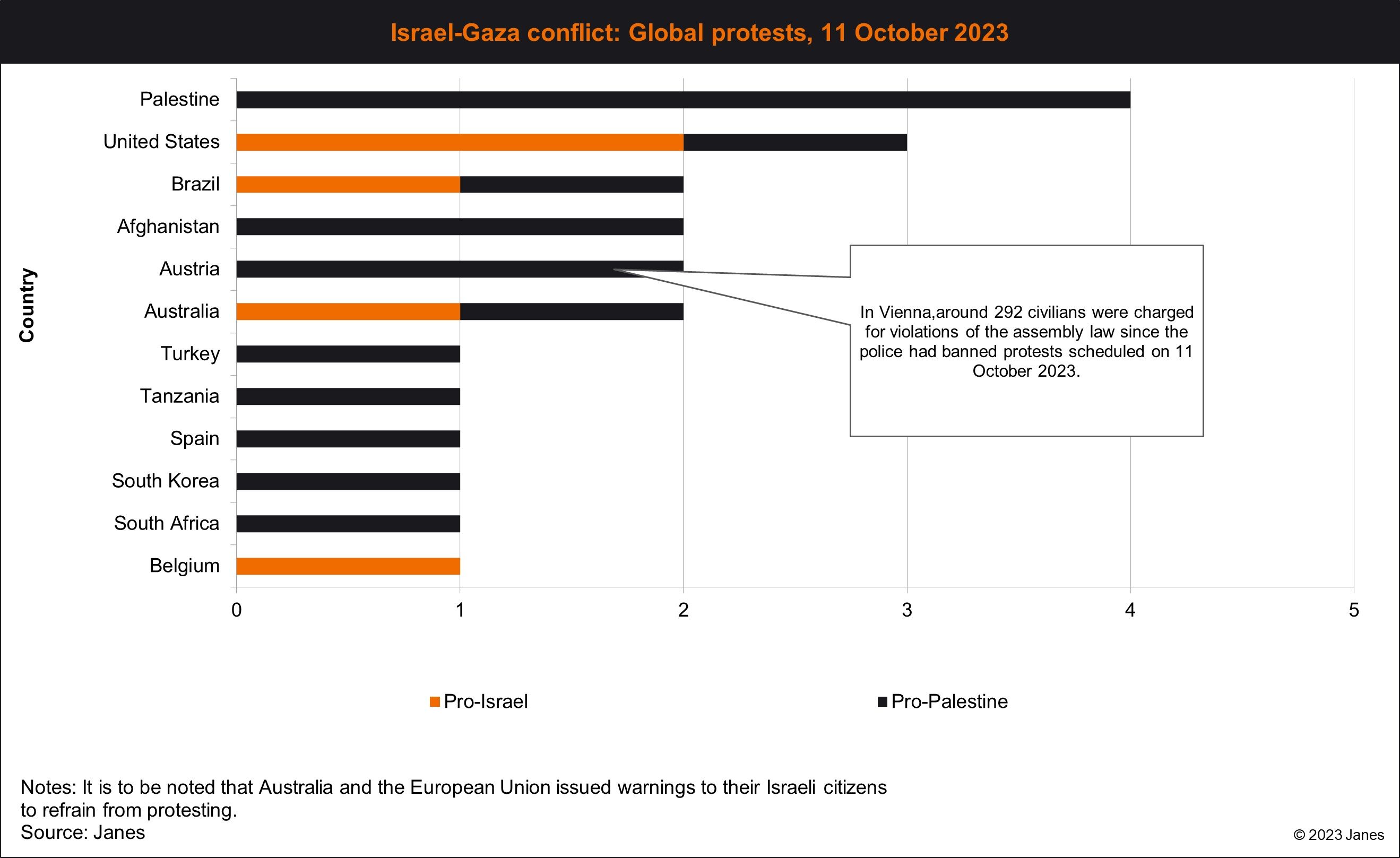
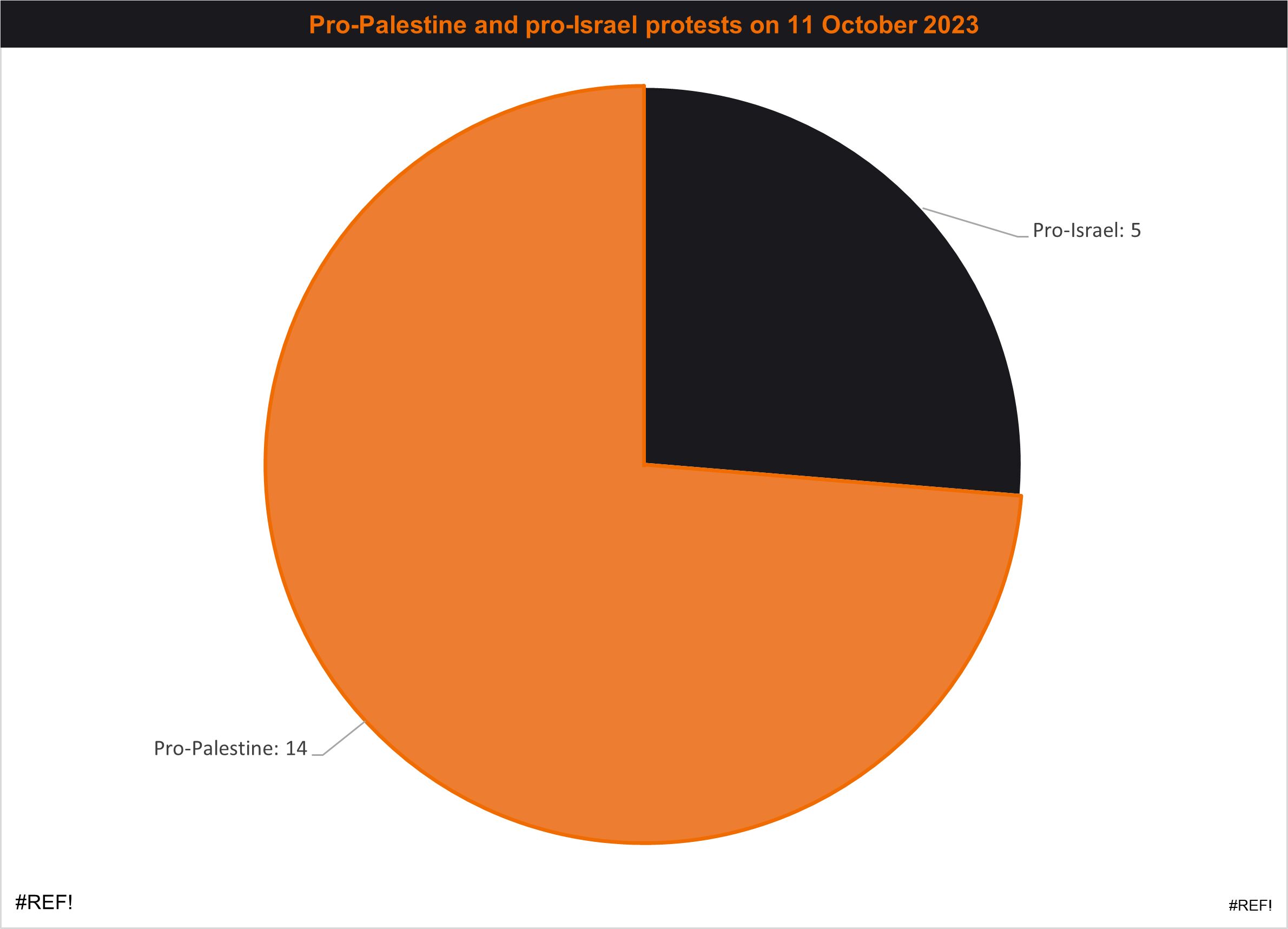
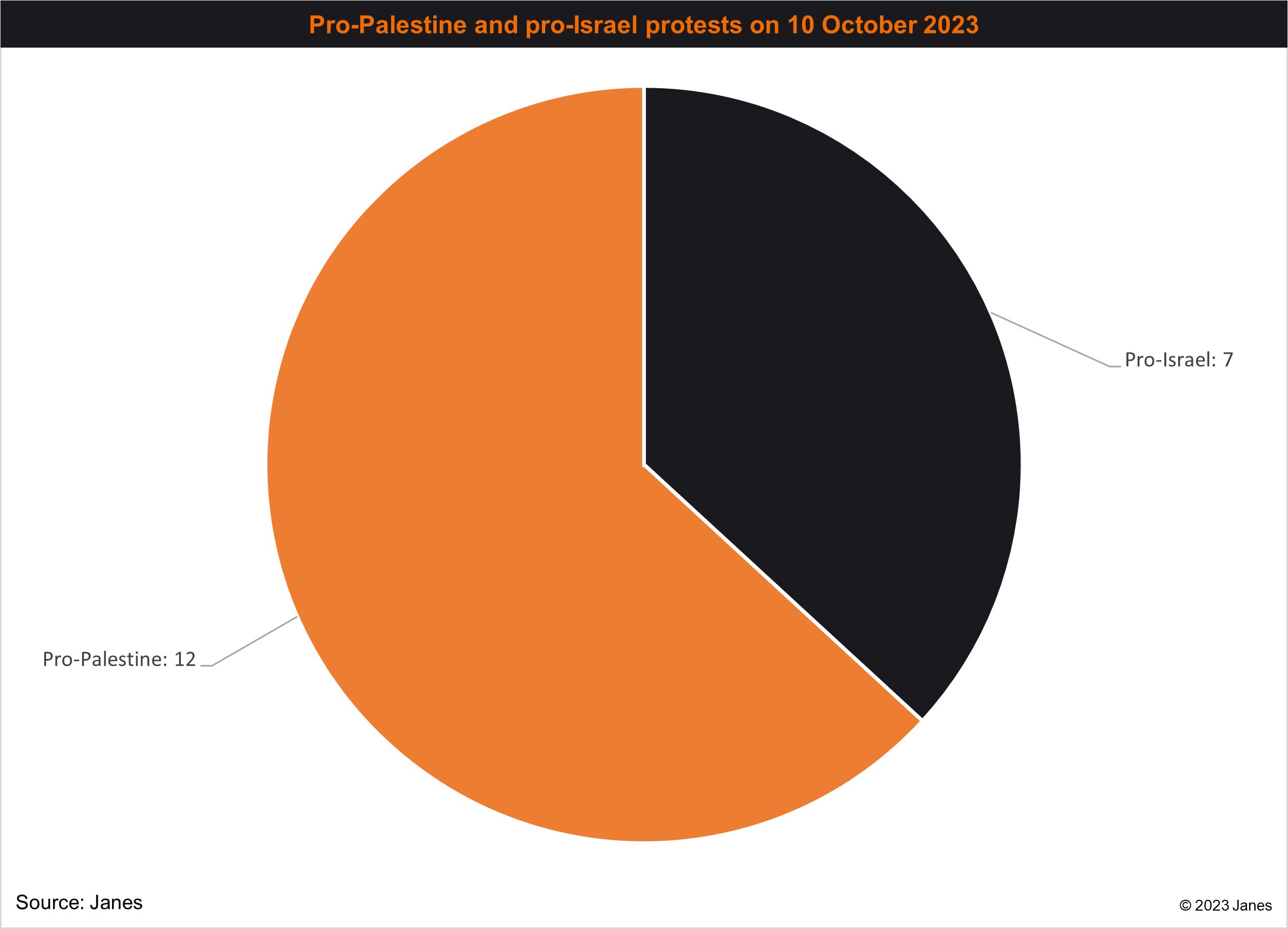
Timeline of Israel-Gaza major conflicts
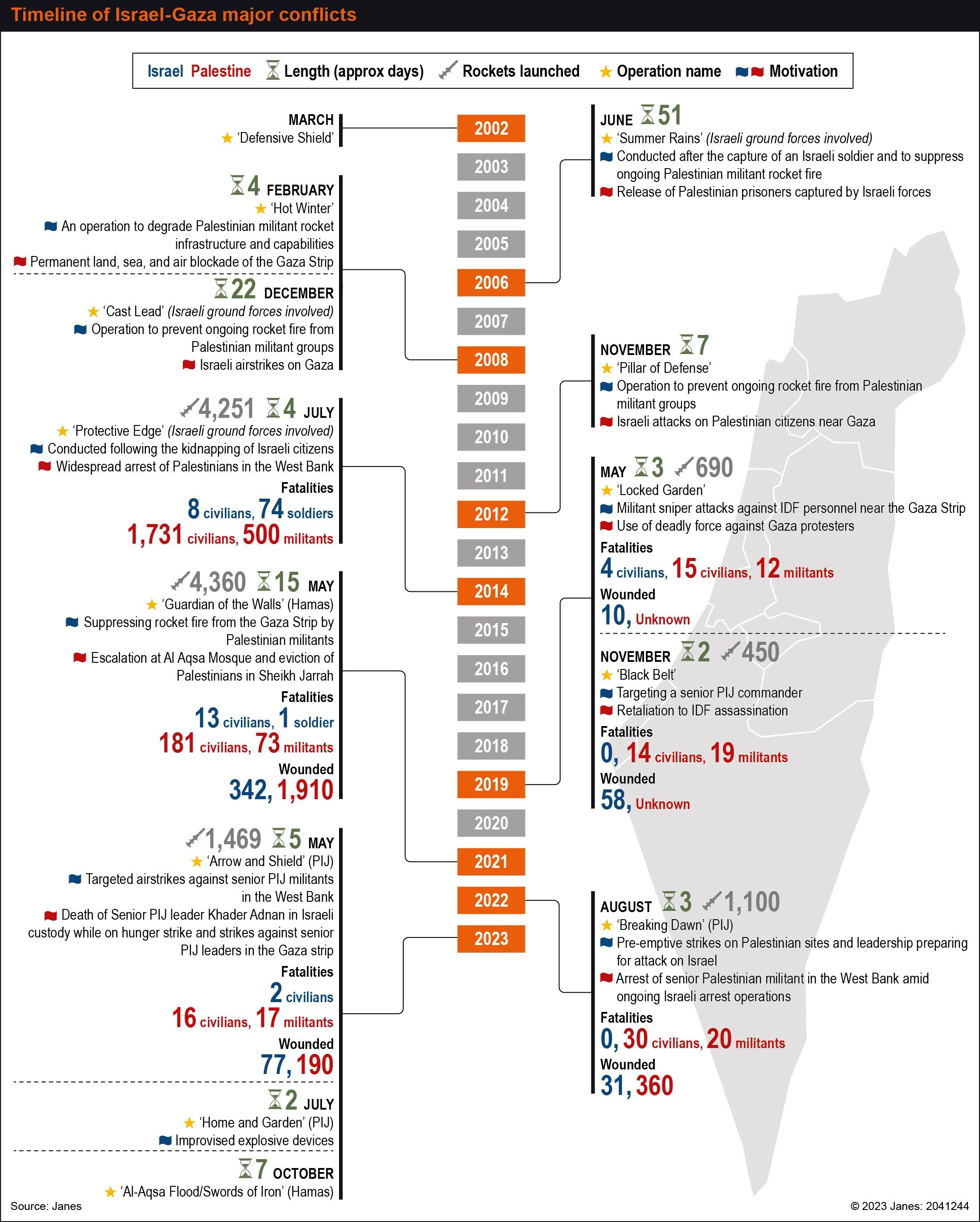
Timeline of Israel-Gaza major conflicts. (Janes)
https://www.janes.com/defence-news/news-detail/israel-gaza-situation-update-12-october-20231510 h local time: “The air force continues to vigorously attack terrorist infrastructure throughout...
 Details
Details